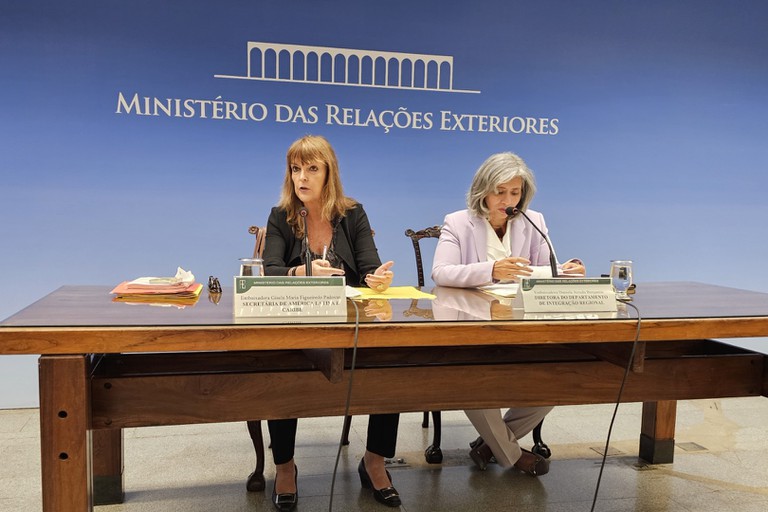Advanced cookie settings
To improve your experience on the platform and provide personalized services, we use cookies.
Notícias
FOREIGN AFFAIRS

During a meeting with the press on Thursday, April 3, MRE’s secretary for Latin America and the Caribbean Ambassador Gisela Padovan (left) highlighted the importance of regional integration - Credit: Thaís Custódio/Secom-PR
President Luiz Inácio Lula da Silva will attend the IX Summit of Heads of State and Government of the Community of Latin American and Caribbean States (CELAC) taking place next Wednesday, April 9, in Tegucigalpa, Honduras. On that occasion, priority issues for the bloc will be discussed, such as regional integration, combating climate change and food security.
Lula is expected to travel to Tegucigalpa on Tuesday (8) to attend the meeting of heads of State from the bloc that gathers the 33 countries of Latin America and the Caribbean. The event starts on Monday (7) with a meeting of coordinators and another one with the foreign ministers, while the Summit itself begins on Wednesday (9). The IX Summit also marks the end of Honduras’ pro tempore presidency and its transfer to Colombia.
During the press briefing this Thursday, April 3, Ambassador Gisela Padovan, secretary for Latin America and the Caribbean at Brazil’s Ministry of Foreign Affairs (Ministério das Relações Exteriores/MRE), highlighted the importance of regional integration. “The President’s participation is a clear indication how strongly he has always prioritized integration. Per our Constitution, Brazil must pursue precisely CELAC, by building a community of Latin American and Caribbean nations,” said Padovan. She recalled that Lula’s first foreign policy act in 2023, the first year of the current administration, was to determine Brazil’s return to CELAC.
UNIFIED CANDIDACY — Brazil will propose to the bloc’s leaders a joint candidacy for the position of Secretary-General of the United Nations (UN), preferably a woman, given that the role has never been held by a female leader. The mandate of the current Secretary-General, António Guterres, ends next year, when a new leader will be selected. “As per the regional rotation scheme, we believe it is the turn of Latin America and the Caribbean to take this position. In this context, we will propose that countries unite around a single candidacy, which would strengthen our chances of upholding the rotation principle,” Padovan explained.
SECURITY AND IMMIGRATION — Heads of State are also expected to address immigration during the event. “In the past, we have had a working group that regularly dealt with immigration. The idea is for this to resume because this is a theme that impacts all countries in the region, be it through the incoming or outgoing flows of people,” argued Ambassador Daniela Benjamin, director of MRE’s Department of Regional Integration.
SECURITY AND BILATERALS — Brazil will also advocate for the Community to publicize the joint declaration on women, peace, and security. In addition to participating at the Summit, President Lula will hold bilateral meetings with leaders from the region.
GLOBAL ENGAGEMENT — CELAC also maintains dialogue with blocs and countries outside the region. In this context, two major events are planned for this year: the CELAC–European Union Forum, scheduled for December, and the China–CELAC Forum, with the date yet to be confirmed.
DIMENSION — CELAC countries encompass an area of more than 22 million square kilometers in Latin America and the Caribbean, which is the equivalent to five times the territory of the European Union. The total population of 670 million is double the number of inhabitants of the United States.
